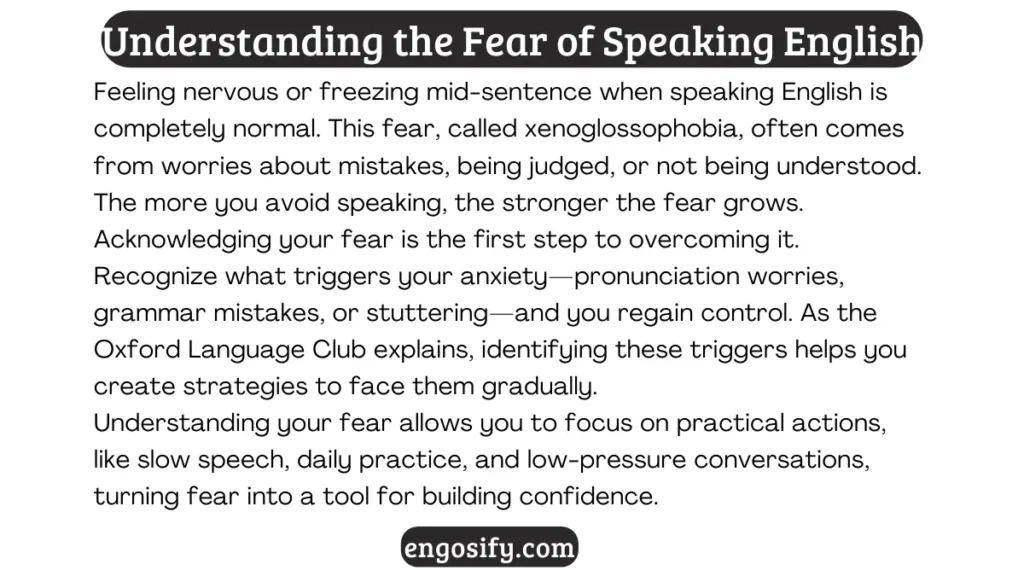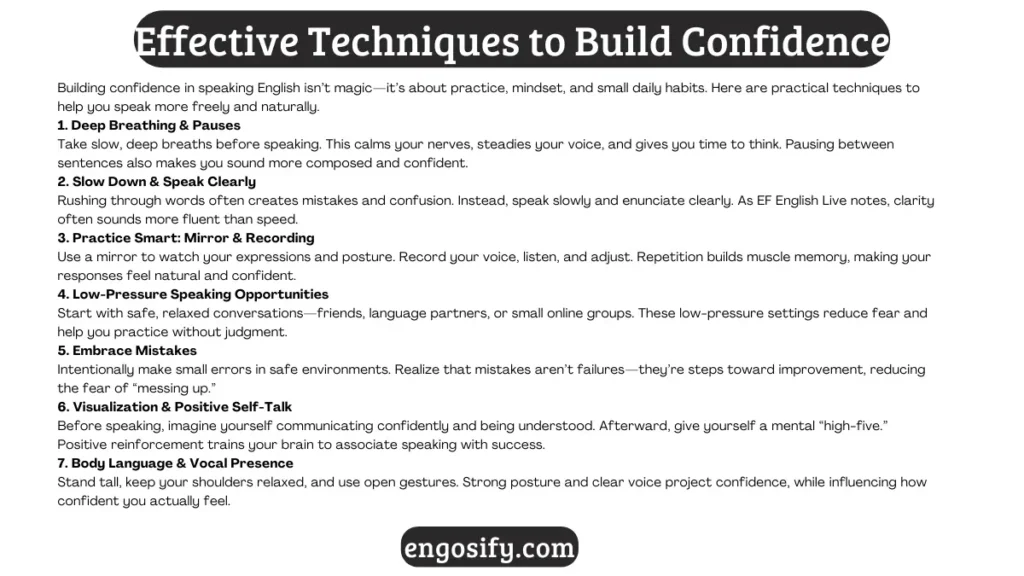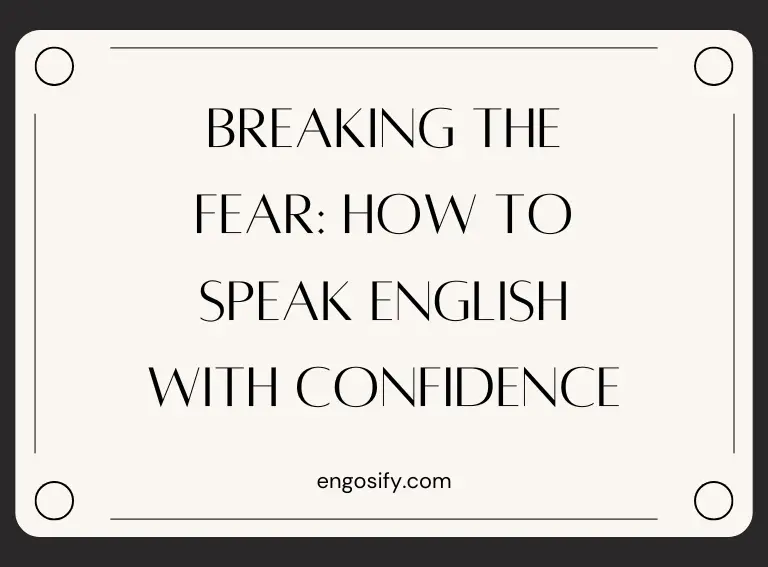Introduction
Ever felt your palms sweat, your heart race, or your mind go blank just before opening your mouth to speak English? You’re not alone. Millions of learners experience the same jitters. This article is your road map to breaking the fear and speaking English with confidence. We’ll uncover what causes this anxiety, shift your mindset from perfection to progress, and reveal practical ways to build real speaking confidence. With proven strategies, insider tips, and supportive communities, you’ll soon realize that fluency and confidence aren’t far-off dreams—they’re reachable goals.
Introduction & Understanding the Fear
Understanding the Fear of Speaking English
When you try to speak a new language, it’s common to feel a knot in your stomach. This fear, sometimes called xenoglossophobia (the fear of speaking foreign languages), can spring from several triggers: fear of making mistakes, being judged, or simply not being understood. For many, these worries snowball into full-blown anxiety that blocks progress. According to Oxford Language Club’s guide on overcoming speaking anxiety, recognizing these triggers is the first step to dissolving them. Once you know what sparks the fear, you can start to tackle it head-on instead of letting it quietly undermine your efforts.
Why Confidence Matters
Confidence isn’t just a nice add-on; it’s the engine that powers effective communication. When you speak English with confidence, your words land more clearly, your listeners focus on your message, and opportunities—whether academic, professional, or social—suddenly open up. Moreover, speaking boldly reinforces itself: each successful conversation boosts your self-esteem, which in turn encourages you to keep practicing. Rather than thinking of confidence as an elusive trait that only extroverts possess, view it as a skill you can build with steady practice, mindset shifts, and the right tools.

Myth-Busting & Mindset Shifts
Myth vs. Reality
A lot of learners believe myths that quietly sabotage their progress. One of the biggest myths is that only extroverts can be confident speakers. Yet countless shy people speak English with confidence once they learn the right techniques. Another common myth is “fast equals fluent.” In reality, speed often clouds clarity. Confidence isn’t about racing through your sentences; it’s about delivering your ideas clearly and calmly. As EF English Live explains in its six unusual confidence-boosting tips, slowing down can actually make you sound more fluent and self-assured.
From Perfection to Progress
Perfectionism might seem like a noble goal, but when it comes to speaking a language, it’s a trap. If you wait until every verb is perfect and every pronunciation flawless, you’ll never open your mouth. Instead, shift your focus from perfection to progress. Each small, imperfect conversation chips away at your fear. Over time, your brain learns that mistakes aren’t disasters—they’re stepping stones to mastery. This mindset relieves pressure and makes speaking feel like an experiment rather than an exam.
Building a Growth Mindset
Now that you’re loosening the grip of perfectionism, it’s time to build a growth mindset. Start with simple habits: visualize yourself succeeding in a conversation, celebrate each milestone (no matter how small), and talk to yourself kindly before and after speaking. These mental shifts, backed by research on language learning and public speaking, gradually rewire your brain for confidence. They also make practice feel less like a chore and more like a series of wins, which motivates you to keep going.
Effective Techniques to Build Confidence
Deep Breathing & Pauses
Before you speak, pause and take a slow, deep breath. This simple act calms your nerves, lowers your heart rate, and gives you a moment to collect your thoughts. When you breathe deeply, your voice sounds steadier and more grounded. Plus, pausing between sentences—not rushing—signals to listeners that you’re composed. It’s like pressing a reset button that steadies your speech and quiets your inner critic.
Slow Down & Speak Clearly
Racing through words may feel like fluency, but it often creates confusion. Instead, slow down, enunciate, and use natural pauses. When you speak English clearly, your listeners understand you better, which in turn boosts your confidence. Even seasoned public speakers practice this. As EF English Live explains in its confidence-boosting guide, clarity and calmness make you sound far more fluent than speed ever could.
Practice Smart: Mirror, Recording, Repetition
Stand in front of a mirror and watch yourself speak. Notice your mouth movements, your posture, and your expressions. Then, record your voice on your phone. When you listen back, you’ll catch areas to improve and also hear what you’re already doing well. Repetition—whether with phrases, dialogues, or role-plays—builds muscle memory so your responses come out naturally.
Low-Pressure Speaking Opportunities
Confidence grows in safe spaces. Find a partner, join an online conversation group, or attend a local language club. You’ll practice in real time without the fear of harsh judgment. Over time, these relaxed conversations create a solid foundation for public speaking or high-stakes situations.
Embrace Mistakes (Unusual Practice)
Here’s an odd but powerful trick: deliberately make small mistakes in a low-stakes setting. For example, use a slightly wrong word with a friend and then correct yourself. By exposing yourself to harmless errors, you desensitize your brain to the fear of “messing up.” Soon you’ll realize mistakes aren’t dangerous—they’re just part of learning.
Visualization & Self-Applause
Before a conversation, close your eyes and imagine yourself speaking confidently and being understood. Afterward, even if it wasn’t perfect, give yourself a mental high-five. This positive reinforcement trains your brain to associate speaking with success instead of stress.
Body Language & Vocal Presence
Your body speaks before your mouth does. Stand tall, keep your shoulders relaxed, and maintain gentle eye contact. A steady posture and open gestures project confidence, even when you’re nervous inside. A warm tone and clear voice complete the package, making you sound approachable and credible. Over time, your body language will start to influence how confident you actually feel.
Structured Practice & Community Support
Join Public-Speaking or Language Clubs
If you’ve been practicing alone, it’s time to step into a supportive community. Clubs like Toastmasters or informal language meetups offer a low-pressure stage where you can practice, get feedback, and build friendships with other learners. According to Toastmasters’ public speaking page, consistent participation not only hones your speaking skills but also desensitizes you to the fear of audiences. This steady exposure transforms anxiety into a sense of “I’ve got this.”
Seek Feedback and Mentorship
Practicing alone is valuable, but constructive feedback accelerates your progress. Ask a trusted friend, tutor, or mentor to listen to you speak and offer gentle corrections. Because feedback highlights blind spots, you’ll improve faster and feel more secure. With each session, you’ll notice your pronunciation, grammar, and pacing sharpening.
Track Your Progress
Keep a simple speaking journal or a digital log. Write down what you practiced, how you felt, and what went well. Over weeks, you’ll see a record of small victories that prove you’re moving forward. This evidence reinforces your motivation and turns your journey into a visible success story.
Real-World Speaking Engagements
Finally, bring your skills into real-life situations. Volunteer to introduce yourself at meetings, lead a small presentation, or participate in community events. Because real-world exposure strengthens what you’ve learned in practice, each new speaking opportunity expands your comfort zone. Soon, what once felt intimidating will feel like second nature.

FAQs
How do I stop being afraid to speak English?
Start small and in safe spaces. Chat with a friend, record yourself, or join a beginner-friendly club. Combine deep breathing, visualization, and slow, clear speech to calm your nerves. Over time, your brain learns that speaking isn’t dangerous but doable, and your confidence naturally grows.
How long does it take to speak English confidently?
There’s no magic number. For some, confidence develops in months; for others, it takes longer. However, steady practice, a growth mindset, and real-life exposure speed up the process. By focusing on progress rather than perfection, you’ll notice steady improvement rather than endless waiting.
What exercises boost English-speaking confidence?
Mirror practice, voice recording, and repetition are classic exercises. Additionally, use low-pressure conversations, join language clubs, and try visualization before speaking. These activities strengthen both your skills and your self-belief, turning shaky starts into smooth dialogues.
How can I reduce anxiety before speaking?
Prepare by breathing deeply, stretching your shoulders, and picturing yourself succeeding. Use positive self-talk like “I’ve prepared and I’m ready.” Arrive early to your speaking space so you feel settled. When your body feels calm, your words come out steadier, and your confidence shines through.
Conclusion
Speaking English with confidence isn’t some unreachable dream reserved for the “naturally gifted.” It’s a skill you build step by step—just like learning to ride a bike. By understanding the real roots of your fear, busting myths about perfection and speed, and adopting practical techniques like deep breathing, mirror practice, and low-pressure conversations, you chip away at the anxiety that’s been holding you back.
And because confidence grows through action, joining supportive communities such as public-speaking or language clubs gives you a safe stage to practice. Each time you push yourself a little further, you’re not just improving your English—you’re rewiring your brain to trust itself.
So, as you move forward, remind yourself that mistakes are simply stepping stones, not stop signs. Celebrate your small wins, keep practicing, and visualize your success. With patience, persistence, and the right strategies, you’ll discover that breaking the fear leads not only to better English but also to a more empowered version of yourself.

